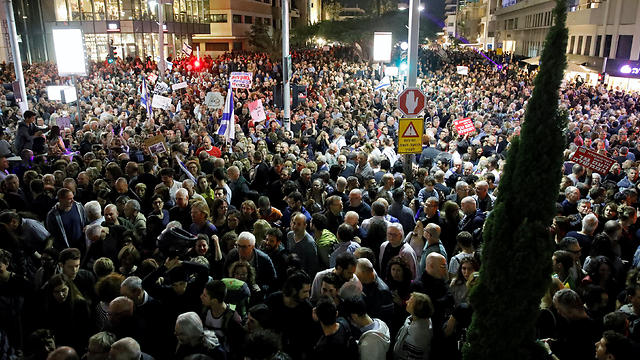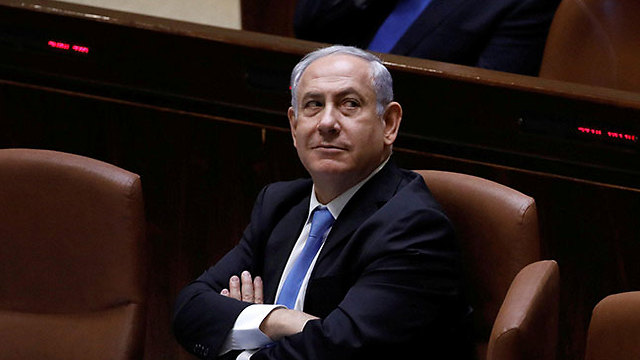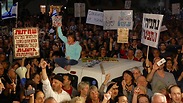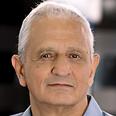
Rothschild Boulevard protest: The second generation
Op-ed: The shift of the anti-corruption protest from a small Petah Tikva square to one of Tel Aviv’s main streets reflects much more than a change of location on the map. What began as a protest of two people is turning into a mass protest before our eyes against government corruption.
They headed to Tel Aviv in droves
on Saturday evening. Not on buses, but rather by foot. Not on behalf of left-wing NGOs, but on their own behalf. They moved up Rothschild Boulevard, in a line that grew thicker and thicker before spilling over into Allenby Street and blocking it.


I don’t know how many people were there, but there are two things I can testify to: First, it was very crowded at the heart of the protest, just like in the right-wing protests in Jerusalem’s Zion Square; second, quite a few rallies have been held over the years outside the historical Tel Aviv Museum building, including the outburst of joy after David Ben-Gurion announced the establishment of the State of Israel there. That was, most probably, one of the biggest, if not the biggest rally of all.

Saturday evening’s protest. The 2011 protest didn’t draw hundreds of thousands of people at its inception either (Photo: Reuters)
The move from Petah Tikva’s Goren Square to Tel Aviv’s Rothchild Boulevard reflected much more than a change of location on the map. What began as a protest of two people, Meni Naftali and Eldad Yaniv, is turning into a mass protest before our eyes. It has yet to reach the dimensions of the 2011 social protest that began on Rothschild Boulevard, but the 2011 protest didn’t draw hundreds of thousands of people at its inception either.
Saturday evening’s protestors were the sons of veteran, organized Israel, people from the middle and upper class. There were hardly any representatives of other sectors—periphery residents, religious Jews, Arabs, poor Israelis. A similar crowd can be seen at the annual Rabin memorial rallies at Rabin Square, with one difference: At the Rabin rallies there are mostly elderly people and teenagers, members of youth movements. Saturday evening’s protest was also attended by the middle generation.
The slogans were taken from the Saturday protests at Petah Tikva and from the tent protest of the summer of 2011. Then, the people demanded social justice; now, they’re demanding legal justice. “It’s our state, not Netanyahu's,” the protestors chanted. “We’ll prosecute you because the people don’t believe you”; “The government versus the people—the people versus the government”; “Sovereignty belongs to the people.”
I don’t think the people—in other words, the majority of Israel’s citizens—are demanding legal justice. Not just yet. Protest movements, however, never waited for orders from the people. They went forward, hoping to be joined by the masses later on. All protest movements falsely spoke on behalf of the people when they began.

Prime Minister Netanyahu's abuse of power is much worse than the offenses he is being interrogated over (Photo: Reuters)
Nevertheless, Prime Minister Benjamin Netanyahu has a problem. At this stage he has no good convincing answer to the “Mushchatim Nimastem” (we’re sick of the corrupt) claim. He knows that the sense of disgust doesn’t stop at Rothschild Boulevard. The steps he is taking to thwart his investigations are causing discomfort among his own supporters too.
“Neither left, nor right, but straight!” one of the protestors wrote on a poster he prepared at home. “Ethics,” the protestors chanted in rhythm. These are chants that cannot be easily eliminated by arguing that this is just a dark left-wing scheme. They’re not a manipulation; they’re a fact.
Corruption wasn’t invented by Netanyahu. There was corruption in Israel before he took office, and there will be corruption even after he leaves office. He isn’t the first prime minister with a mountain of suspicions piling up around him, but he’s the first prime minister who’s trying to change the democratic rules of the game, the first one who’s saying: I’m going to stop playing by the rules. His abuse of power is much worse than the offenses he is being interrogated over.
On Monday, the Knesset was expected to convene for one of the most shameful days in its history, but that was abruptly delayed by MK David Bitan (Likud). When that vote does take place, it is expected to approve the bill to silence investigations. Coalition members will vote against their conscience, against the state’s best interest, against the values they preach. The people who protested Saturday evening said: This isn’t according to our norms. They managed to somewhat reduce the extent of the disgrace.

















